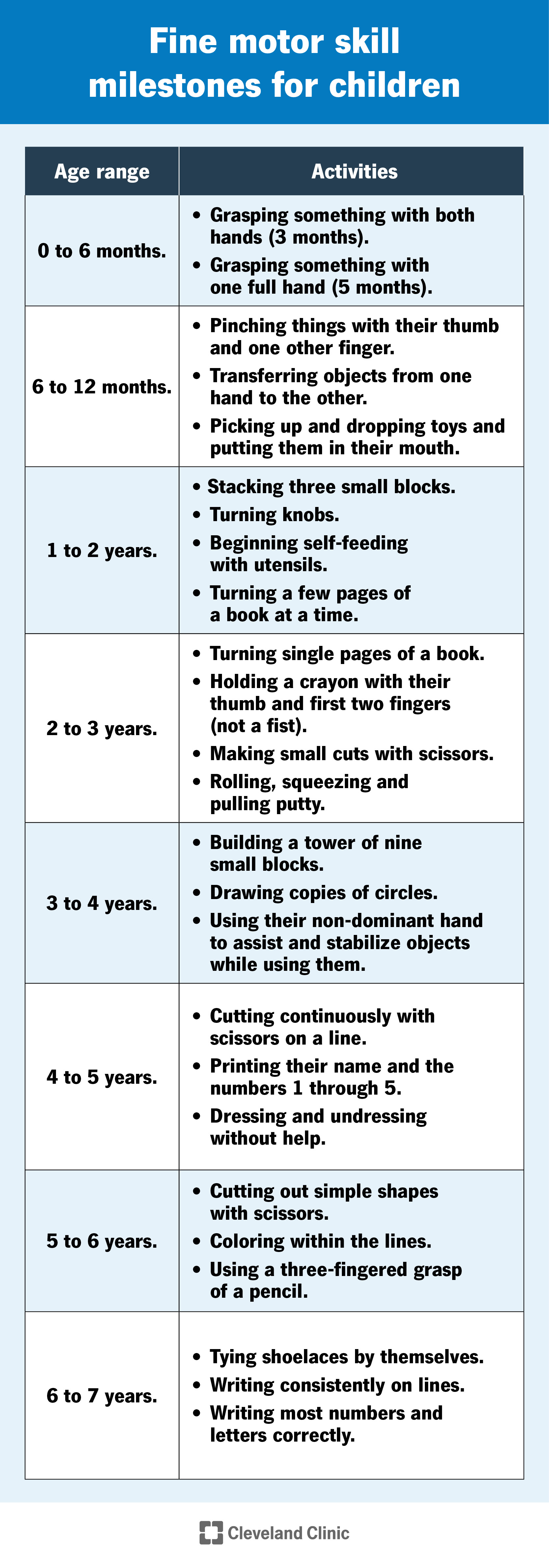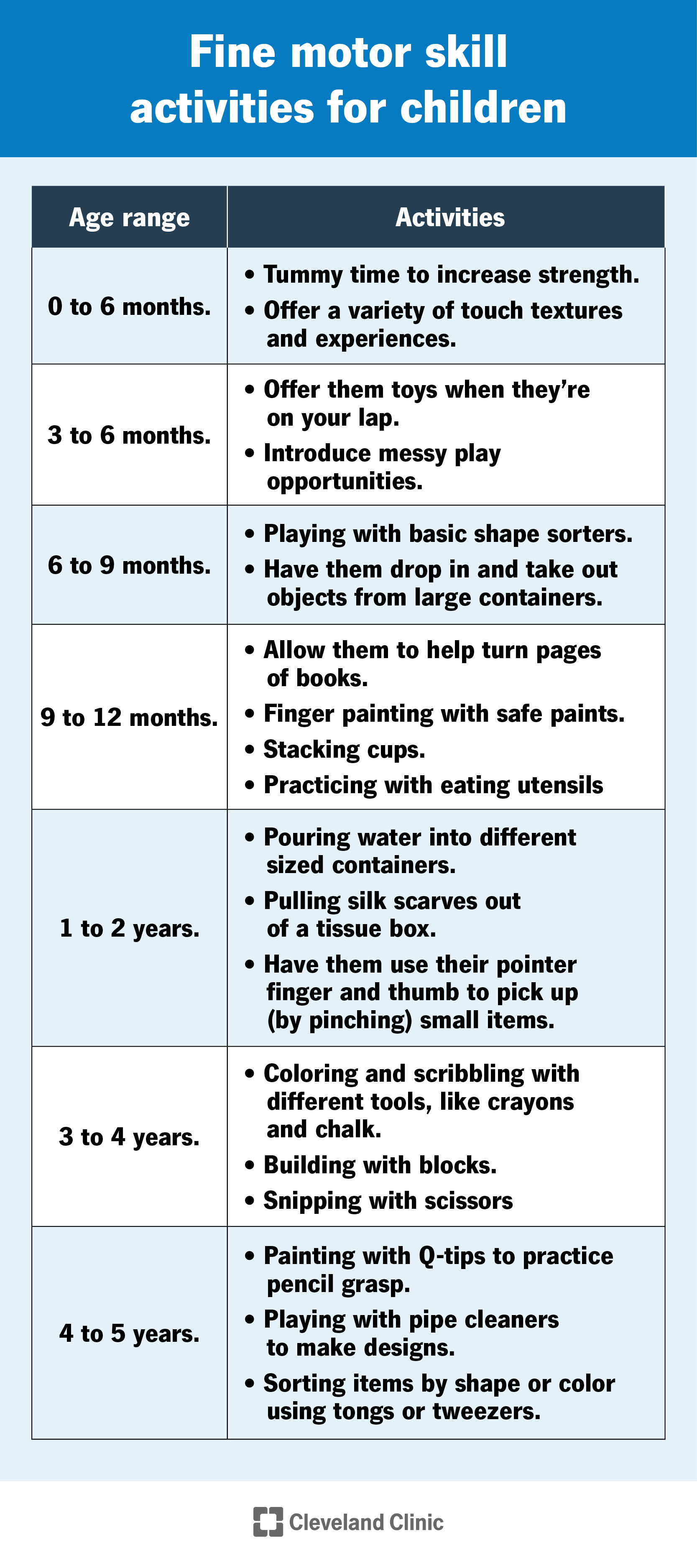Fine motor skills are the tiny movements we make with our hands, fingers, feet and toes. They allow us to do countless everyday tasks. We develop these skills from birth to adulthood. Healthcare providers have benchmarks — or milestones — for different fine motor skills at different age ranges. Talk to your child’s provider about what you should expect at different age levels.
Advertisement
Cleveland Clinic is a non-profit academic medical center. Advertising on our site helps support our mission. We do not endorse non-Cleveland Clinic products or services. Policy
Fine motor skills are the small, precise movements we make with our hands, fingers, feet and toes. They involve the complex coordination of your muscles, joints and nerves.
Advertisement
Cleveland Clinic is a non-profit academic medical center. Advertising on our site helps support our mission. We do not endorse non-Cleveland Clinic products or services. Policy
We mainly think of hand, wrist and finger movements when it comes to fine motor skills, like picking up an object by pinching it with your pointer finger and thumb. But you can also make fine movements with your foot, ankle and toes. These motions are necessary for sports, like dancing and soccer, or for people who use their feet for tasks instead of their hands.
Fine motor control is a complex process that requires:
Issues with fine motor skills can develop at any age. But healthcare providers put a lot of focus on fine motor skills in child development. Child development refers to how your child grows and changes over time. Experts divide child growth and development into four areas:
Providers carefully assess fine motor skills because significant delays in these milestones can be a sign of a variety of neurological and physical conditions. And the sooner your child’s provider can catch it, the sooner your child can get the help they need.
Advertisement
Examples of fine motor skills include:
Life would be quite different if humans hadn’t developed fine motor skills.
Countless everyday tasks require tiny, precise movements — from holding a toothbrush to cooking and eating to putting on clothes. Even texting and giving your dog a belly rub require these skills. All of these tasks are important for independence and self-care. They also allow us to enjoy certain hobbies, like playing instruments and video games and crafting.
For a child, fine motor skills are important for doing schoolwork, like drawing and writing. Several work-related tasks involve fine motor skills, too — like using construction tools or a computer or performing surgery.
Developmental milestones are the behaviors that mark stages of typical growth. Children all develop at their own pace. However, most children pass through specific changes at roughly the same time as they get older.
Examples of fine motor skill milestones for infants and children include (but aren’t limited to):

Image content: This image is available to view online.
View image online (https://my.clevelandclinic.org/-/scassets/images/org/health/articles/25235-fine-motor-skills-milestones.jpg)
Fine motor skills continue to develop and strengthen after these ages. It’s important to remember that each child develops at their own pace. If you’re concerned about your child’s fine motor milestones, talk to their healthcare provider.
Fine motor skills start developing as soon as you’re born. For example, babies are typically born with an involuntary (not by choice) grasp reflex. If you graze your finger along their palm, they’ll usually close up their hand and cling to your finger. This is the earliest type of fine motor movement.
These tiny movements keep improving as a child gets older — and into adulthood. Over time, your child’s muscles get stronger, and they develop more coordination to perform more precise movements.
Even adults can refine their fine motor skills. For example, rock climbers may work on improving their grip strength to better cling to rock crevices. And surgeons may do exercises to practice making accurate, steady and precise movements with their hands.
There are also ways to help your child practice fine motor skills.
Here are some activities you can do to help your infant or child develop fine motor skills:
Advertisement

Image content: This image is available to view online.
View image online (https://my.clevelandclinic.org/-/scassets/images/org/health/articles/25235-fine-motor-skills-activities.jpg)
Issues with any of the following body areas can affect fine motor skills:
Because of this, hundreds of conditions can interfere with fine motor skills. The interference can range from mild to severe. For example, it may take more focus and time than usual to fasten a button, or you may not be able to complete the task at all.
Some of these conditions are treatable or manageable. Others may cause permanent issues with fine motor skills.
Conditions that can affect fine motor skills in children include (but aren’t limited to):
Conditions that can affect fine motor skills in children and adults include (but aren’t limited to):
Advertisement
Conditions that can affect fine motor skills in adults include (but aren’t limited to):
It may be challenging at first to learn you or your child has fine motor skill difficulties. The good news is that there are countless ways to adapt or modify everyday tasks and activities to make them more accessible.
An occupational therapist can help you. An occupational therapist is a healthcare provider who helps people of all ages improve their ability to perform daily tasks. They’ll help you learn how to use different tools or techniques to participate in your activities safely. The therapist may help you learn exercises and ways to manipulate objects. For children, this can include playing with toys and using school manipulatives. Occupational therapy helps people live as self-sufficiently as possible. They’ll provide ideas, exercises and tools to use at home.
Examples of adaptations include:
Advertisement
There are also several types of adaptive equipment. For example, a button hook allows you to fasten buttons without using your fingers (you grasp the base of the hook). There are also eating utensils of various types that are specially designed to allow you to eat independently.
If you’re worried your child isn’t reaching fine motor skill milestones, talk to their pediatrician. They’ll ask questions about your concerns and can perform tests. You can also reach out to your child’s school for an evaluation.
If you or your child has a regression (worsening) in fine motor skills, talk to your healthcare provider as soon as possible, especially if the regression is sudden. This could be a sign of a serious underlying condition.
Fine motor skills develop throughout your life from birth to adulthood. While simply exploring their environment can help infants and children develop these skills, there are activities you can do to help support their development. If you’re concerned about your child’s fine motor skills, talk to their healthcare provider. Several conditions can interfere with these tiny movements.

Sign up for our Health Essentials emails for expert guidance on nutrition, fitness, sleep, skin care and more.
Learn more about the Health Library and our editorial process.
Cleveland Clinic’s health articles are based on evidence-backed information and review by medical professionals to ensure accuracy, reliability and up-to-date clinical standards.
Cleveland Clinic’s health articles are based on evidence-backed information and review by medical professionals to ensure accuracy, reliability and up-to-date clinical standards.
As your child grows, you need healthcare providers by your side to guide you through each step. Cleveland Clinic Children’s is there with care you can trust.
